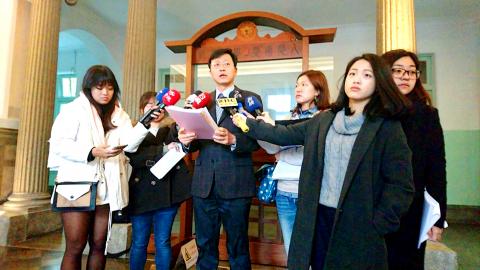National Taiwan University (NTU) yesterday released stage-two investigation results on an academic fraud scandal involving professor Kuo Min-liang (郭明良), which saw the university move to fire Kuo and professor Chang Cheng-chi (張正琪), while clearing NTU president Yang Pan-chyr (楊泮池), who cowrote four problematic papers published by Kuo’s team.
Two internal investigation teams and an investigation committee comprising members from outside the institution found that Kuo’s research team presented a host of misleading images in six papers, of which two have been retracted by science journals Nature Cell Biology and the Journal of Biological Chemistry.
The sheer number of problematic images was proof that Kuo “purposefully” added them to the papers, the report said.

Photo: Hsiao Yu-hsin, Taipei Times
The problems manifested in 2006, when Kuo — as the papers’ corresponding author — was responsible for supervising research work, but he chose to neglect the issue and involved a number of his graduate, doctoral and postdoctoral researchers in the presentation of more errors, it said.
The university decided to dismiss Kuo, who should assume “the greatest and ultimate responsibility,” it said.
Chang, whose name was absent from the first-stage investigation results, duplicated and improperly edited several images in four papers, including the 2008 article, of which she was the lead author, the investigation found.
She has been disqualified as a professor, dismissed, barred from re-applying for a teaching position at the university for five years and prohibited from requesting research grants from the school for five years.
Yang, who coauthored four problematic papers, “bears no responsibility” for the falsified data presented in the papers and therefore “has no reason to resign,” the university said.
In a 19-page report, the committee said Yang only provided some general advice on the direction of the research and his clinical insights on the four papers.
Yang’s involvement was limited to the parts he contributed and coauthors were responsible for checking their contributions to the paper, the committee said.
“By a vote of six to zero, our committee concluded that, based on Ministry of Science and Technology regulations, Dr Yang bears no responsibility for the manipulated figures that mainly involve immunoblots,” the committee said.
One of the questions the committee said it assessed was whether Yang should resign in the way former Minister of Education Chiang Wei-ling (蔣偉寧) did over an academic misconduct scandal 2014.
The question has been raised by educators who called for Yang to step down.
Chiang was unknowingly listed by his former student Chen Cheng-wu (陳震武) as a coauthor in a fake online peer review ring Chen helped create in an attempt to have work published by international journals.
Yang’s case fundamentally differs from the earlier case in the nature and the magnitude of the offense, the committee said.
“Therefore, we feel that it is inappropriate to suggest that, based on this earlier case, President Yang should resign,” it said.

SECURITY: As China is ‘reshaping’ Hong Kong’s population, Taiwan must raise the eligibility threshold for applications from Hong Kongers, Chiu Chui-cheng said When Hong Kong and Macau citizens apply for residency in Taiwan, it would be under a new category that includes a “national security observation period,” Mainland Affairs Council (MAC) Minister Chiu Chui-cheng (邱垂正) said yesterday. President William Lai (賴清德) on March 13 announced 17 strategies to counter China’s aggression toward Taiwan, including incorporating national security considerations into the review process for residency applications from Hong Kong and Macau citizens. The situation in Hong Kong is constantly changing, Chiu said to media yesterday on the sidelines of the Taipei Technology Run hosted by the Taipei Neihu Technology Park Development Association. With

CARROT AND STICK: While unrelenting in its military threats, China attracted nearly 40,000 Taiwanese to over 400 business events last year Nearly 40,000 Taiwanese last year joined industry events in China, such as conferences and trade fairs, supported by the Chinese government, a study showed yesterday, as Beijing ramps up a charm offensive toward Taipei alongside military pressure. China has long taken a carrot-and-stick approach to Taiwan, threatening it with the prospect of military action while reaching out to those it believes are amenable to Beijing’s point of view. Taiwanese security officials are wary of what they see as Beijing’s influence campaigns to sway public opinion after Taipei and Beijing gradually resumed travel links halted by the COVID-19 pandemic, but the scale of

A US Marine Corps regiment equipped with Naval Strike Missiles (NSM) is set to participate in the upcoming Balikatan 25 exercise in the Luzon Strait, marking the system’s first-ever deployment in the Philippines. US and Philippine officials have separately confirmed that the Navy Marine Expeditionary Ship Interdiction System (NMESIS) — the mobile launch platform for the Naval Strike Missile — would take part in the joint exercise. The missiles are being deployed to “a strategic first island chain chokepoint” in the waters between Taiwan proper and the Philippines, US-based Naval News reported. “The Luzon Strait and Bashi Channel represent a critical access

Pope Francis is be laid to rest on Saturday after lying in state for three days in St Peter’s Basilica, where the faithful are expected to flock to pay their respects to history’s first Latin American pontiff. The cardinals met yesterday in the Vatican’s synod hall to chart the next steps before a conclave begins to choose Francis’ successor, as condolences poured in from around the world. According to current norms, the conclave must begin between May 5 and 10. The cardinals set the funeral for Saturday at 10am in St Peter’s Square, to be celebrated by the dean of the College